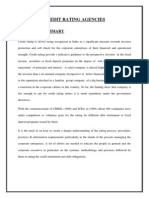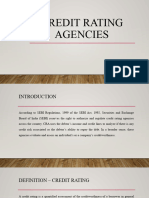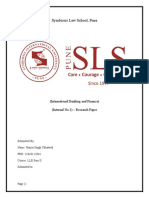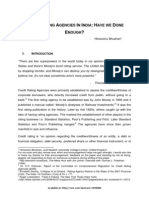Credit rating agencies play a crucial role in the financial world by providing evaluations of the
creditworthiness of companies, governments, and other entities that issue debt securities. These
evaluations can impact investment decisions and access to capital markets.
Credit rating agencies typically assign a credit rating to the issuer of debt, based on factors such as
the issuer's financial health, payment history, and overall debt burden. These ratings can range from
AAA, the highest rating, to D, indicating that the issuer is in default.
Some of the well-known credit rating agencies are Standard & Poor's, Moody's Investors Service, and
Fitch Ratings. These agencies are paid by the issuers of debt to rate their securities, which has led to
criticism of conflicts of interest. To address these concerns, the 2010 Dodd-Frank Wall Street Reform
and Consumer Protection Act established regulations to increase transparency and accountability in
the credit rating process.
What is a Credit Rating?
A credit rating is an assessment of the creditworthiness of a borrower in general terms or with
respect to a particular debt or financial obligation. It can be assigned to any entity that seeks to
borrow money — an individual, corporation, state or provincial authority, or sovereign government.
Evaluating the creditworthiness of an instrument comprises of both qualitative and quantitative
assessments, making credit rating far from a straightforward mathematical calculation.
What are Credit Rating Agencies?
A credit rating agency (CRA) is a company that rates debtors based on their ability to pay back their
interests and loan amount on time and the probability of them defaulting. CRAs were set up to
provide independent evidence and research-based opinion on the ability and willingness of the
issuer to meet debt service obligations, quintessentially attaching a probability of default to a
specific instrument.
Credit rating agencies in India came into existence in the second half of the 1980s. In India, CRAs are
regulated by SEBI (Credit Rating Agencies) Regulations, 1999 of the Securities and Exchange Board of
India Act, 1992.
Importance of Credit Rating
Here are the benefits of credit rating for money lenders and borrowers:
For Lenders
�Better Investment Decision: No bank or money lending companies would like to give money to a
risky customer. With credit rating, they get an idea about the creditworthiness of a company (that is
borrowing the money) and the risk factor attached with them. By evaluating this, they can make a
better investment decision.
Safety Assured: High credit rating means an assurance about the safety of money and that it will be
paid back with interest on time.
For Borrowers
Easy Loan Approval: With a high credit rating, you will be seen as a low/no risk customer. Therefore,
banks will approve your loan application easily.
Competitive Rate of Interest: You must be aware of the fact that every bank offers loans in a
particular range of interest rates. One of the major factors that determine the rate of interest on the
loan you take is your credit history. Higher the credit rating, lower the rate of interest.
Credit Rating Agencies in India
Following are the details of credit rating agencies in India:
1.Credit Rating Information Services of India (CRISIL) Limited
Credit Rating Information Services of India Limited calculates the credit worthiness of companies
based on their strengths, market share, market reputation and board. It also rates companies, banks
and organizations, helping investors make a better decision before investing in companies’ bonds.
Besides India, it is also operational in countries including the USA, the UK, Hong Kong, Poland,
Argentina and China. It offers 8 types of credit rating which are as follows:
AAA, AA, A – Good Credit Rating
BBB, BB – Average Credit Rating
B, C, D – Low Credit Rating
2. Investment Information and Credit Rating Agency of India (ICRA) Limited
Investment Information and Credit Rating Agency of India offers comprehensive ratings to
corporates via a transparent rating system. Its rating system includes symbols which vary with the
financial instruments. Various types of credit ratings offered by ICRA are Bank Loan Credit Rating,
Corporate Debt Rating, Corporate Governance Rating, Financial Sector Rating, Issuer Rating,
Infrastructure Sector Rating, etc.
�3. Credit Analysis and Research Limited (CARE)
Credit Analysis and Research Limited (CARE) offers a range of credit rating services in areas like debt,
bank loan, corporate governance, recovery, financial sector and more. Its rating scale includes two
categories – long term debt instruments and short term debt ratings.
4. India Ratings and Research Pvt. Ltd.
It evaluates the credibility of corporate issuers, managed funds, financial institutions, project finance
companies, urban local bodies and structured finance companies. It has its headquarters in Mumbai
and other branch offices in Delhi, Ahmedabad, Chennai, Hyderabad, Bengaluru, Kolkata and Pune.
5. Brickwork Ratings India Private Limited
This credit rating agency is responsible for rating bank loans, municipal corporation, capital market
instruments and SMEs. Other than this, it is also responsible to grade real estate investments,
hospitals, NGOs, MFI, etc. It offers various rating systems depending upon the different financial
instruments. It has Canara Bank as its promoter and strategic partner.
6. Infometrics Valuation and Rating Pvt Ltd
This is a SEBI-registered, and RBI-accredited credit rating agency that was founded by former
bankers, finance professionals and administrative services personnel. It assesses and calculates
credit ratings for banks, NBFCs, large corporates and SMUs (small and medium scale units). It aims
to play a key role in serving the financial markets by minimizing the information asymmetry among
different lenders and investors and facilitating borrowers to several fundraising opportunities.
SEBI’s Detection for CRAs
The Securities and Exchange Board of India tightened disclosure standards for credit rating agencies
while assigning ratings to companies and their debt instruments.
The regulator directed that rating agencies must now disclose the liquidity position of a company
being rated.
�If the rating is assigned on the assumption of cash inflow, the agencies would need to disclose the
source of the funding.
Rating agencies must disclose their rating history and how the ratings have transitioned across
categories.
Credit rating firms will also have to analyze the deterioration of liquidity and also check for asset
liability mismatch.
There are six credit rating agencies registered under SEBI namely, CRISIL, ICRA, CARE, SMERA, Fitch
India and Brickwork Ratings.
CONLCUSION
Another measure taken by the government and regulators is the promotion of competition in the
credit rating industry. This includes encouraging new entrants into the market and promoting
innovation in credit rating methods and practices. This increased competition can help to improve
the quality of credit ratings and increase the level of credibility among investors.
In conclusion, credit rating agencies play a critical role in the global financial system and in India.
They provide valuable information to investors, lenders, and other stakeholders by assessing the
creditworthiness of individuals, corporations, and governments. Despite the criticisms, credit ratings
continue to be a widely used tool for investors, and regulators are taking steps to improve the
quality of credit ratings and restore the credibility of the industry.
2. "Credit Ratings." Investopedia. (https://www.investopedia.com/terms/c/creditrating.asp)
3. "The Dodd-Frank Wall Street Reform and Consumer Protection Act."
(https://www.govtrack.us/congress/bills/111/hr4173/text)
4. "European Securities and Markets Authority (ESMA)." (https://www.esma.europa.eu/about-
esma)
5. "SEC's Guidelines for Nationally Recognized Statistical Rating Organizations (NRSROs)."
(https://www.sec.gov/rules/interp/2010/34-62374.pdf)




















































































